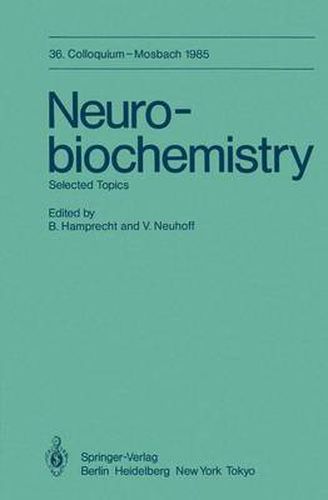Readings Newsletter
Become a Readings Member to make your shopping experience even easier.
Sign in or sign up for free!
You’re not far away from qualifying for FREE standard shipping within Australia
You’ve qualified for FREE standard shipping within Australia
The cart is loading…






This title is printed to order. This book may have been self-published. If so, we cannot guarantee the quality of the content. In the main most books will have gone through the editing process however some may not. We therefore suggest that you be aware of this before ordering this book. If in doubt check either the author or publisher’s details as we are unable to accept any returns unless they are faulty. Please contact us if you have any questions.
The field of the neurosciences is one of the most rapidly growing in present biological research. Its molecular aspects are dealt with by the discipline of neurobiochemistry. As the theme of the Mosbacher Colloquium, we chose this term rather than the term neurochemistry , in order to stress the dynamic biochemical aspects of present molecu- lar neurobiology and to avoid the flavor of being purely descriptive and static , which is frequently associated with the term neurochem- istry. This appears the more warranted, since the natural products and analytical chemistry phase of discovering the basic chemical com- ponents of the nervous system has passed its culmination. The period of assessment has laid the foundation for studying the dynamic inter- play of the various chemical components in the actual biological opera- tion of nervous tissue. Thus, neurobiochemis~ry is that part of the neurosciences which is dominated by the ways of thinking and the metho- dology of biochemistry. For this Colloquium only topics were selected that deal with the biochemistry of neurons. Thus, we excluded from the agenda other neu- ral cells such as glial cells (astrocytes, ependymal cells, oligoden- drocytes), meningeal cells, and capillary endothelial cells. This restriction was applied for two reasons: (1) The time available for the meeting did not allow an extensive display of the whole spectrum of neurobiochemical research. (2) The biochemistry of neurons is far more advanced than that of any other cell type of the nervous system *.
$9.00 standard shipping within Australia
FREE standard shipping within Australia for orders over $100.00
Express & International shipping calculated at checkout
This title is printed to order. This book may have been self-published. If so, we cannot guarantee the quality of the content. In the main most books will have gone through the editing process however some may not. We therefore suggest that you be aware of this before ordering this book. If in doubt check either the author or publisher’s details as we are unable to accept any returns unless they are faulty. Please contact us if you have any questions.
The field of the neurosciences is one of the most rapidly growing in present biological research. Its molecular aspects are dealt with by the discipline of neurobiochemistry. As the theme of the Mosbacher Colloquium, we chose this term rather than the term neurochemistry , in order to stress the dynamic biochemical aspects of present molecu- lar neurobiology and to avoid the flavor of being purely descriptive and static , which is frequently associated with the term neurochem- istry. This appears the more warranted, since the natural products and analytical chemistry phase of discovering the basic chemical com- ponents of the nervous system has passed its culmination. The period of assessment has laid the foundation for studying the dynamic inter- play of the various chemical components in the actual biological opera- tion of nervous tissue. Thus, neurobiochemis~ry is that part of the neurosciences which is dominated by the ways of thinking and the metho- dology of biochemistry. For this Colloquium only topics were selected that deal with the biochemistry of neurons. Thus, we excluded from the agenda other neu- ral cells such as glial cells (astrocytes, ependymal cells, oligoden- drocytes), meningeal cells, and capillary endothelial cells. This restriction was applied for two reasons: (1) The time available for the meeting did not allow an extensive display of the whole spectrum of neurobiochemical research. (2) The biochemistry of neurons is far more advanced than that of any other cell type of the nervous system *.